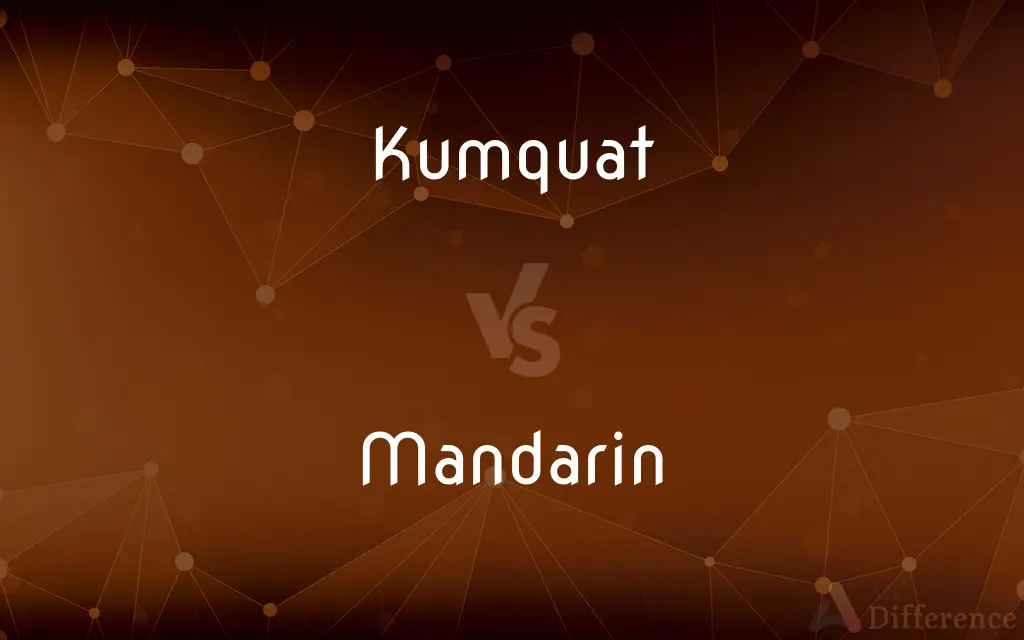Kumquat vs. Mandarin — What's the Difference?

Difference Between Kumquat and Mandarin
ADVERTISEMENT
Compare with Definitions
Kumquat
Kumquats (; Chinese: 金桔, gāmgāt or jīnjú), or cumquats in Australian English, are a group of small fruit-bearing trees in the flowering plant family Rutaceae. They were previously classified as forming the now-historical genus Fortunella, or placed within Citrus, sensu lato.
Mandarin
Any of a group of related dialects of Chinese spoken principally in the north and west of China.
Kumquat
An orange-like fruit related to the citruses, with an edible sweet rind and acid pulp.
Mandarin
The official national standard spoken language of China, based on the Mandarin dialect spoken in and around Beijing. Also called Guoyu, Putonghua.
Kumquat
The East Asian shrub or small tree that yields the kumquat.
ADVERTISEMENT
Mandarin
A member of any of the nine ranks of high public officials in the Chinese Empire.
Kumquat
Any of several trees or shrubs of the genus Fortunella, having small, edible, orangelike fruit.
Mandarin
A high government official or bureaucrat.
Kumquat
The fruit of any of these plants, having an acid pulp and a thin, edible rind.
Mandarin
A member of an elite group, especially a person having influence or high status in intellectual or cultural circles.
Kumquat
A small, orange citrus-like fruit which is native to Asia (Citrus japonica, syn. Fortunella japonica).
Mandarin
A mandarin orange.
Kumquat
Any of several trees or shrubs of the genus Fortunella (formerly Citrus) of the rue family (Rutaceae) (especially Citrus Japonica) growing in China and Japan bearing small orange-colored edible fruits with thick sweet-flavored skin and sour pulp; also, any of the small acid, orange-colored citrus fruits of such plants, used mostly for preserves.
Mandarin
Of, relating to, or resembling a mandarin.
Kumquat
Any of several trees or shrubs of the genus Fortunella bearing small orange-colored edible fruits with thick sweet-flavored skin and sour pulp
Mandarin
Marked by elaborate and refined language or literary style.
Kumquat
Small oval citrus fruit with thin sweet rind and very acid pulp
Mandarin
(historical) A high government bureaucrat of the Chinese Empire.
Mandarin
A pedantic or elitist bureaucrat.
Mandarin
A pedantic senior person of influence in academia or literary circles.
Mandarin
(ornithology) mandarin duck
Mandarin
A senior civil servant.
Mandarin
Ellipsis of mandarin orange:
Mandarin
A small, sweet citrus fruit.
Mandarin
A tree of the species Citrus reticulata.
Mandarin
(color) An orange colour.
Mandarin
Pertaining to or reminiscent of mandarins; deliberately superior or complex; esoteric, highbrow, obscurantist.
Mandarin
A Chinese public officer or nobleman; a civil or military official in China and Annam.
Mandarin
A powerful government official or bureaucrat, especially one who is pedantic and has a strong sense of his own importance and privelege.
Mandarin
A member of an influential, powerful or elite group, espcially within artistic or intellectual circles; - used especially of elder members who are traditionalist or conservative about their specialties.
Mandarin
The form of the Chinese language spoken by members of the Chinese Imperial Court an officials of the empire.
Mandarin
Any of several closely related dialects of the Chinese language spoken by a mojority of the population of China, the standard variety of which is spoken in the region around Beijing.
Mandarin
A small flattish reddish-orange loose-skinned orange, with an easily separable rind. It is thought to be of Chinese origin, and is counted a distinct species (Citrus reticulata formerly Citrus nobilis); called also mandarin orange and tangerine.
Mandarin
Shrub or small tree having flattened globose fruit with very sweet aromatic pulp and thin yellow-orange to flame-orange rind that is loose and easily removed; native to southeastern Asia
Mandarin
A member of an elite intellectual or cultural group
Mandarin
Any high government official or bureaucrat
Mandarin
A high public official of imperial China
Mandarin
A somewhat flat reddish-orange loose-skinned citrus of China
Mandarin
The dialect of Chinese spoken in Beijing and adopted as the official language for all of China
Share Your Discovery

Previous Comparison
Inquisitorial vs. Accusatorial
Next Comparison
Calamity vs. Chaos













































